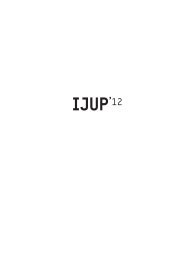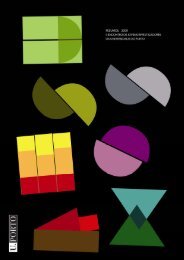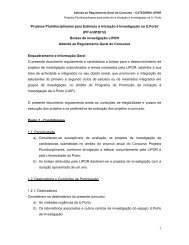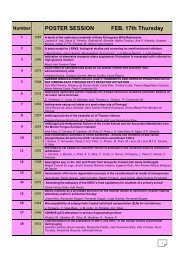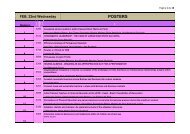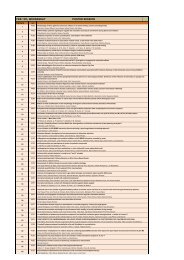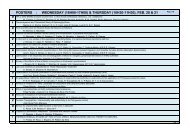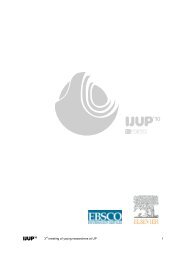IJUP08 - Universidade do Porto
IJUP08 - Universidade do Porto
IJUP08 - Universidade do Porto
- TAGS
- universidade
- porto
- ijup.up.pt
Create successful ePaper yourself
Turn your PDF publications into a flip-book with our unique Google optimized e-Paper software.
Monitoring of Biological Remediation of a Soil Polluted with<br />
Petroleum Hydrocarbons<br />
E. Monteiro 1* , M. N. Couto 1,2 , and M. T. S.D.Vasconcelos 1,2<br />
1 Faculty of Sciences, University of <strong>Porto</strong>, Portugal.<br />
2 CIMAR/CIIMAR – Centre of Marine and Environmental Research, University of <strong>Porto</strong>, Portugal<br />
*c0303048@alunos.fc.up.pt<br />
Due to several human activities many petroleum hydrocarbons (PHC) have been<br />
introduced in soil and sediments. Much PHC, particularly the less volatile ones (LVPHC),<br />
are persistent and can be tightly sorbed into soil particles, decreasing PHC bioavailability.<br />
Biological remediation is a low cost way for recovering polluted soil, which rehabilitates<br />
soil structure. A project is in process to survey, as exhaustively as possible, the main<br />
factors that influence the efficiency of biological degradation of LVPHCs assisted by<br />
vascular plants (bioaugmentation and rhizoremediation). Plants well adapted to coastal<br />
areas and capable of living in soils with relatively high salinity were chosen. This pilot<br />
study is carrying out ex-situ, in polluted soil from a petrol refinery. At the beginning and<br />
during the study, the LVPHCs contents are determining both in soil and lixiviate, by using<br />
spectrophotometry [1], after suitable PHC extraction from the samples. The role of the<br />
under-graduated student in the project is the optimization of analytical methods for an<br />
expeditious monitoring of the efficiency of PHC degradation.<br />
This project provides a real mesocosmos study, in a field with specific characteristics, and<br />
it is expected that in a middling/long time it will give clear conclusions about suitable<br />
conditions for decontamination of either the global area of the refinery or other sites with<br />
similar contamination.<br />
In this communication, the first results of the project will be presented and discussed.<br />
[1] Liste, H-H and Felgentreu, D. (2006), Crop growth, culturable bacteria, and degradation of<br />
petrol hydrocarbons (PHCs) in a long-term contaminated field soil, Applied soil Ecology 31, 43-<br />
52.<br />
Acknowledgements: To FC&T for the Ph.D. scholarship of M. N. Couto (SFRH/31816/2006). To<br />
Refinery of Oporto (GALP Energy) for financial support. Logistical support by J. Amorim, from<br />
Refinery of Oporto and technological advices and logistical support by I. Teixeira, R. Salé and E.<br />
Bernardes from Berka – Engº E. Bernardes, Lda and M. I. Caça<strong>do</strong>r from Oceanographic Inst. of<br />
Sci. Fac, L.U.<br />
87



